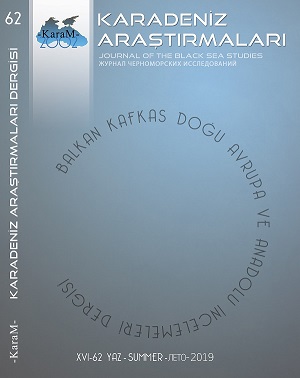Eski Anadolu Türkçesiyle Manzum Bir Metin: Emīrī’nin Mevlid’i”
A Poetical Text in Old Anatolian: Emīrī’s Mawlid
Author(s): Uğur UzunkayaSubject(s): Language studies, Islam studies, 15th Century, Philology, Turkic languages
Published by: Karadeniz Araştırmaları Merkezi
Keywords: Old Anatolian Turkish; Emīrī; Mawlid; the birthday of the Prophet Muhammad;
Summary/Abstract: Mawlid as a term comes to mean ‘the birthplace and the birthday’. Mawlid, which is evaluated as a poetical type during Old Anatolian Turkish, is the name given to the works that are mostly written in verse and in the form of a mathnawi and it has the characteristics of Prophet Muhammad's birth, his ascension and his miracles. Mawlid texts begin with the poetry of God’s oneness and greatness, invocation, and the poem praising the Prophet Muhammad. These chapters are followed by the poetries on Prophet Muhammad’s birth, his ascension, his diverse miracles and his death respectively. Mawlid texts are completed with the prayer chapter. The tradition of Mawlid writing found in almost all of the Islamic world has an important place in Islamic history, literature, art and music. This paper aims to present in Latin alphabet transcription, the orthographic characteristics and linguistic analysis of the mawlid text written by Emīrī, who is accepted as a 15th century poet in various anthologies. The only known copy of Mawlid by Emīrī is currently located in the Süleymaniye Manuscript Library in Istanbul and carries the identification number of Ayasofya 3821/3. This mawlid text is among the folios 31b-45b of the work in which it is bound and is composed of 15 folios. It was written in naskh style with vowel point of the Arabic script, each of the page contains 13 lines. The mawlid text in question consists of 345 couplets and 4 poetries composed of three verses written in the ramal meter. Since another copy could not be determined, this manuscript for the transcription of the text is taken as a basis. Although the text has no date regarding when it was copied, it is determined that the manuscript has linguistic characteristics of Old Anatolian Turkish in the light of linguistic points.
Journal: Karadeniz Araştırmaları
- Issue Year: 2019
- Issue No: 62
- Page Range: 335-357
- Page Count: 23
- Language: Turkish

